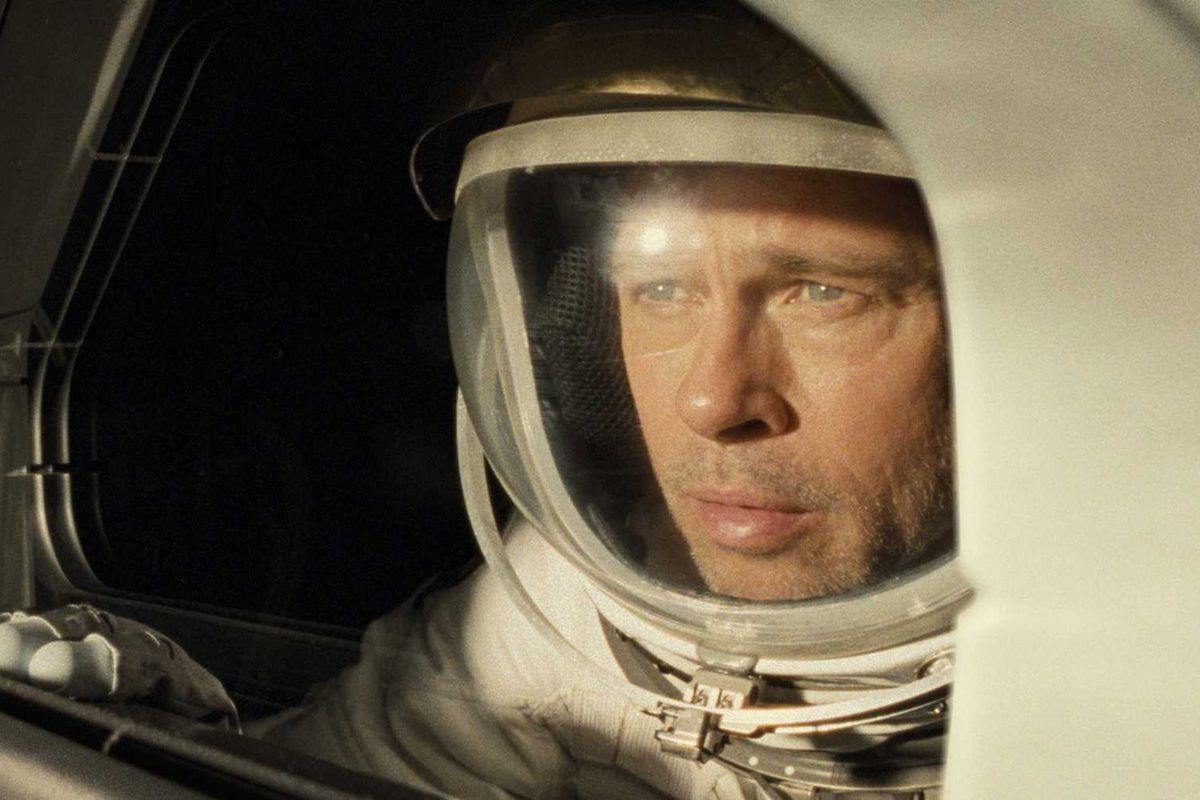On Rotten Tomatoes, at the time of this review, Ad Astra has a very impressive critic rating of 83%, but a fairly underwhelming audience score of 45%. And, in truth, the variation in these ratings perfectly sums up this film. For film fanatics, this is a work of art, but for the general public, this is a relatively dull and uneventful couple of hours.
Director James Gray stated that his work on Ad Astra was largely inspired by Apocalypse Now and its literary source material, Joseph Conrad’s Heart of Darkness, which is undoubtedly clear throughout the movie. The decision to focus on the journey of a single character, Roy McBride (Brad Pitt), as he navigates mysterious and dangerous environments in pursuit of a potentially dangerous, unstable character is evidently derived from the work of Conrad in his 1899 novella – and certainly leads to some interesting and, at times, highly intense moments.
It is in these moments that the film demonstrates the potential to develop a gripping narrative, with Gray, on occasion, utilising the eeriness of Roy’s solitude in the vastness of space to good effect. One particular scene, in which Roy investigates a strange and creepy abandoned space shuttle, is especially memorable.
Yet, sadly, these moments are simply too infrequent to keep the audience interested from start to finish. In attempting to create a sense of mystery and isolation, Gray fails to deliver enough satisfying or exciting incidents to make this a majorly enjoyable experience. The possibilities of space are endless, but the writing team never truly take advantage of its unimaginable potential. Far too often, Gray is seen to engage in almost self-indulgent directorial work, choosing to favour satisfying cinematography over a satisfying story.
The character work is almost non-existent. Roy ultimately acts as the sole focus of the film, but often has very little to do. Pitt tries his best in the role, but his character is simply not distinctive or interesting enough to unleash his full potential. In many ways, this is the antithesis to his work on Once Upon a Time in Hollywood; one enabling him to supply over two hours of effortless charm and charisma, the other constraining him to the portrayal of a somewhat bland and uninteresting character. If Pitt is to win an Oscar come awards season, I know which performance I’d put my money on.
The movie’s use of a voiceover helps to establish some sense of depth for the character, enabling the audience to gain a limited understanding of his troubles and torments, but is relatively poorly-written – supplying some bumpy and, at times, almost cringe-worthy lines. In trying to display the affliction of his inner thoughts, the writers often create confusion over the motivations and decision-making of Roy, leading to certain instances that are poorly explained, and sometimes even verging on nonsensical.
Gray’s development of the father-son relationship between Roy and H. Clifford McBride (Tommy Lee Jones) again demonstrates the potential to intrigue, but ultimately fails to properly capture the audience’s attention or empathy. The lack of detailed exposition behind the relationship, combined with the obvious one-sidedness of their dynamic, leads to a lack of care from the viewer – leaving you questioning why Roy is willing to take the risks that he does.
The character of H. Clifford himself is another example of wasted potential. While Gray attempts to establish Clifford as the film’s own Kurtz, Jones’ character fails to provide the chilling impact that is found in either Heart of Darkness or Apocalypse Now, leading to a moderately underwhelming final act. While the character does demonstrate obvious signs of instability, Jones is never truly able to supply the impactful, provocative performance that one would expect. Rather, the film ends in an admittedly emotional, but surprisingly rather tame conversation between Roy and Clifford which leaves you waiting, in vain, for something eventful to occur.
However, while leading to a somewhat weak and uninteresting narrative, Gray’s decision to prioritise the cinematography and aesthetics of the film does ensure that this is one of the most visually stunning productions released this year. Director of Photography Hoyte van Hoytema’s use of 35mm film is spectacular, with the almost hypnotic cinematography helping to make this a treat for film fanatics, and a luxurious lesson in spectacle for aspiring filmmakers. The world-building is genius, with Hoytema’s development of specific, unique colour palettes for each different setting helping to immerse the audience in this sensational universe.
The mind-blowing visuals are underpinned by a captivating score from Max Richter, who demonstrates a remarkable ability to adapt his music to perfectly complement the incidents on screen. In the more tense, personal moments, Richter’s use of slow, high-pitched and almost operatic tunes helps to engross the audience in the hostility and unpredictability of each situation. But with the more grand, dramatic scenes, Richter ramps up the pace and prevalence of his work, helping to emphasise the scale and significance of certain events.
Yet, for all the film’s technical excellence, Ad Astra is still a pretty disappointing affair. While Gray deserves credit for the scale and spectacle of his work, his failure to develop an interesting, compelling narrative leads to a relatively slow and uneventful couple of hours. The movie demonstrates the potential to be something special, but ultimately fails to succeed in its pursuit of greatness.
READ NEXT: 15 Best Sci-Fi Movies of All-Time
Some of the coverage you find on Cultured Vultures contains affiliate links, which provide us with small commissions based on purchases made from visiting our site.

